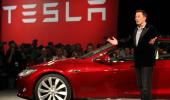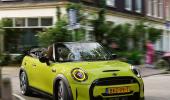The heavy industries ministry has asked US-based electric car major Tesla to first start manufacturing its iconic electric vehicles in India before any tax concessions can be considered, government sources said.

They said that the government is not giving such concessions to any auto firm and giving duty benefits to Tesla will not send a good signal to other companies that have invested billions of dollars in India.
Tesla has demanded reduction in import duties on electric vehicles (EVs) in India.
At present, cars imported as completely built units (CBUs) attract customs duty ranging from 60 per cent to 100 per cent, depending on engine size and cost, insurance and freight (CIF) value less or above $40,000.
In a letter to the road ministry, the US firm had stated that the effective import tariff of 110 per cent on vehicles with customs value above $40,000 is "prohibitive" to zero-emission vehicles.
It has requested the government to standardize the tariff on electric cars to 40 per cent irrespective of the customs value, and withdraw the social welfare surcharge of 10 per cent on electric cars.
It has stated that these changes would boost the development of the Indian EV ecosystem and the company will make significant direct investments in sales, service, and charging infrastructure; and significantly increase procurement from India for its global operations.
The company has argued that these proposals would not have any negative impact on the Indian automotive market as no Indian OEM currently produces a car (EV or ICE) with ex-factory price above $40,000 and only 1-2 per cent of cars sold in India (EV or ICE) have ex-factory/customs value above $40,000.
Union Minister Nitin Gadkari had said Tesla has a golden opportunity to set up its manufacturing facility in India given the country's thrust on e-vehicles.
Tesla is already sourcing various auto components from Indian automakers and setting up base here would be economically viable for it, the road transport and highways minister had said.
Photograph: Kim Hong-Ji/Reuters










